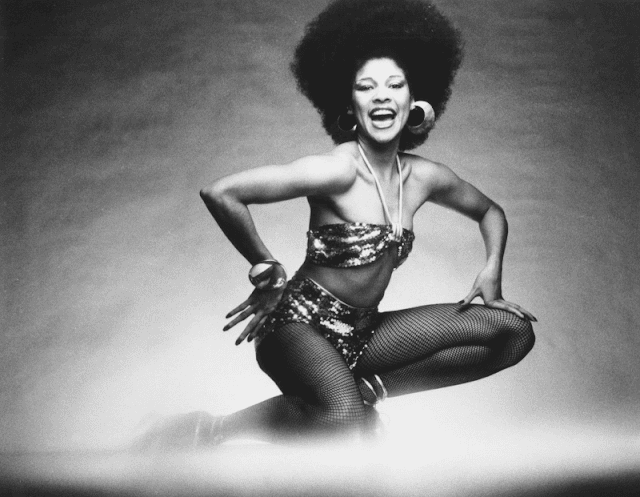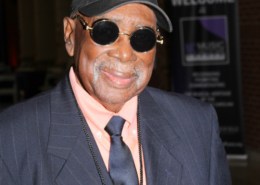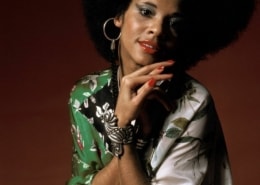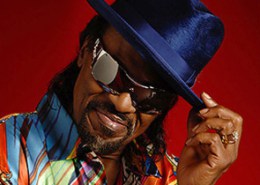Betty Mabry Davis
Biography
Early Years
One can hardly imagine Prince, Erykah Badu, or Outkast without the influence of Betty Davis. Her style of raw and revelatory punk-funk defies any notions that women can’t be visionaries in the worlds of rock and pop.
Known as the Queen of Funk, Betty Davis was born as Betty Mabry in Durham, North Carolina on July 26, 1944. Her grandparents introduced her to the sound of the blues before the family relocated to Homestead, Pennsylvania.Growing up, Betty loved sharing her original songs with neighborhood friends and performing at the local recreation center. After graduating from high school at the age of 16 and accepting a winning spot at the Fashion Institute of Technology in Manhattan, Betty moved to New York. She found work as a model and was featured in magazines like Ebony, Jet and was one of the first Black models featured in Seventeen, and Glamour.
Get Ready for Betty
In 1964, Betty launched her professional career in music with the single 1964 single “Get Ready for Betty.” In addition to writing her own music, Betty wrote music for other artists including the 1960’s hit “Uptown (to Harlem)” for The Chambers Brothers. She also wrote songs for The Commodores which led to their signing with Motown. The Detroit label soon came calling, pitching a Motown songwriting deal, which Davis turned down since they wanted to own everything. In an effort to control the music, she launched her own publishing company, “Fresh Productions.”
During her time in New York and California, she met and gained the respect of musicians the likes of Jimi Hendrix, Sly Stone and Carlos Santana and jazz icon Miles Davis. Mabry and Davis were married in 1968 and parted ways the next year. During that brief time, Betty’s influence by introducing him to her ‘friends’ led to Miles’s acceptance of popular culture and shaped his the trumpeter’s jazz fusion era. She was his muse, appearing on the 1968 album cover of Filles de Kilimanjaro, which features “Mademoiselle Mabry,” a song dedicated to Betty.
Most telling of Betty’s musical influence can be witnessed on The Columbia Years, recorded in 1968-69 and was unearthed and released in 2016 by Light in the Attic. The album attests to Betty’s influence, friendship and music ability in writing, and arranging. The unearthed session includes among other accomplished musicians members of the Jimi Hendrix Band, Herbie Hancock, Wayne Shorter and her ‘man’ Miles Davis. On the album, he and Betty can be heard discussing the music’s direction for the recording.
Expressions of Betty Davis
In 1971, Betty Davis spent several months in London to pursue modeling and continued to write songs. Upon her return to the United States, she had every intention of recording songs with Santana and The Commodores, but when those projects didn’t work out, she organized a group of funk musicians and recorded the songs under her own name. She released her first album, the self-titled Betty Davis, in 1973 and her band included members of Sly and the Family Stone, Graham Central Station, The Pointer Sisters, Tower of Power, and Neil Schon. She went on to release two more studio albums, They Say I’m Different in 1974, and Nasty Gal in 1975. For her second and third album, Betty herself was the producer. This marked the first time that a Black woman was solely credited with writing, arranging, performing on, and producing her own full-length album.
Along with taking control over the production of her albums, Betty brought in a new team of musicians – touring band, North Carolina Funkhouse, which consisted of her cousin, Larry Johnson on bass, Fred Mills on keyboards, double platinum artist Carlton Morales on guitar and her cousin Nikki Neal on drums.
Her 1976 album; Is It Love or Desire remained unreleased until 2009. The renewed interest in Betty’s work resulted in a series of reissues from archival label Light in the Attic — including the first-ever printing of her unreleased 1976 fourth LP — that celebrated her legacy
Going Home
After following her dream in fashion and creating and performing music, Betty was heartbroken after the death of her father Henry. She left the music industry and returned to Homestead where she remained for the rest of her life.
Betty Davis “They Say I’m Different”
In 2017 the documentary Betty: They Say I’m Different was released, titled after her 1974 album, Ms. Davis shares her story in beautiful and haunting ways. The filmmakers, Damon Smith and Phil Cox of Native Voice Films, capture Betty’s life from her early years to her professional career in fashion and music, the consequences of her risque lyrics and performances, the people she influenced, her tumultuous marriage to Miles Davis and the legacy in music that she leaves behind. Most tributaries in the film are personal conversations with Betty.
She is also featured on an episode of Mike Judge’s Tales From the Tour Bus series. In 2019 Ms. Davis released her first new song in over 40 years, “A Little Bit Hot Tonight,” with ethnomusicologist and vocalist Danielle Maggio and her last unrecorded song “Two Hands” was scored by Umebayashi Shigeru, best known for scoring the 2000 movie, In the Mood for Love movie soundtrack.
Betty Mabry Davis: Beloved Legacy
Over the decades, Betty Davis has gained a loyal cult following. The multi-talented music influencer and pioneer rock star, singer, songwriter, and fashion icon paved the way for artists like Prince, Madonna, Erykah Badu, and Janelle Monae and countless others whose style is accepted in today’s mainstream music arena. She influenced the music trajectory of Miles Davis, undeniably one of the greatest jazz trumpeters, she paved a way for women to self express themselves in music and performance styles, and influenced a lasting movement, Black Women Rock: Powered by Daughters of Betty.
At the age of 77, on February 9, 2022, after a series of illnesses Betty Mabry Davis passed away in Homestead, Pennsylvania.
Her light still shines as the Queen of Funk and continues to inspire artists in every genre with her funk performing style and raunchy lyrics that kept her music from the commercial success that spawned acclaimed careers of subsequent generations of performers who credit Betty’s influence still in their music, fashion and performing style today.
Video Biography
Music Sample
BETTY DAVIS FUNKHOUSE BAND
Interview







